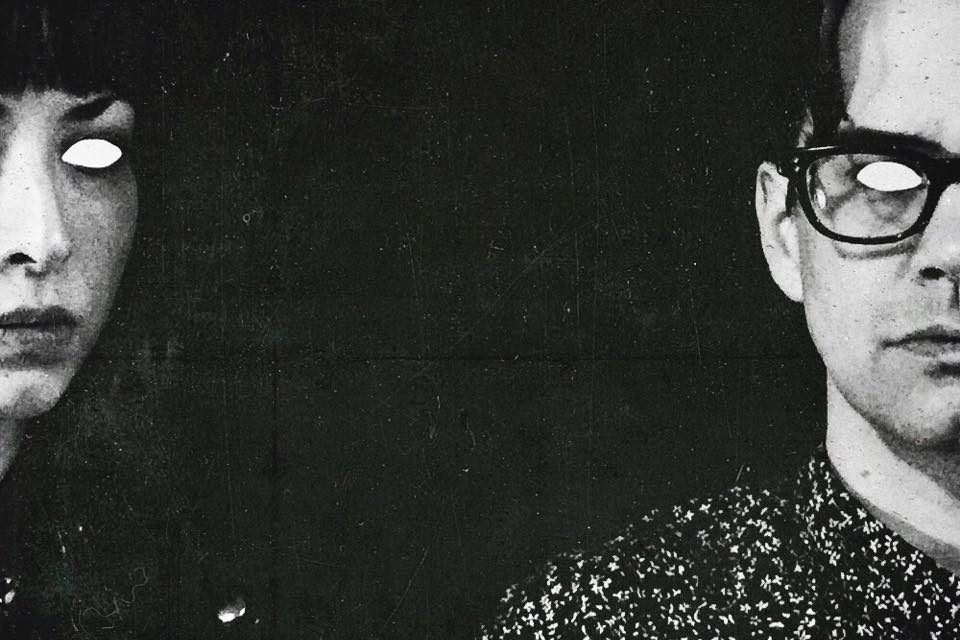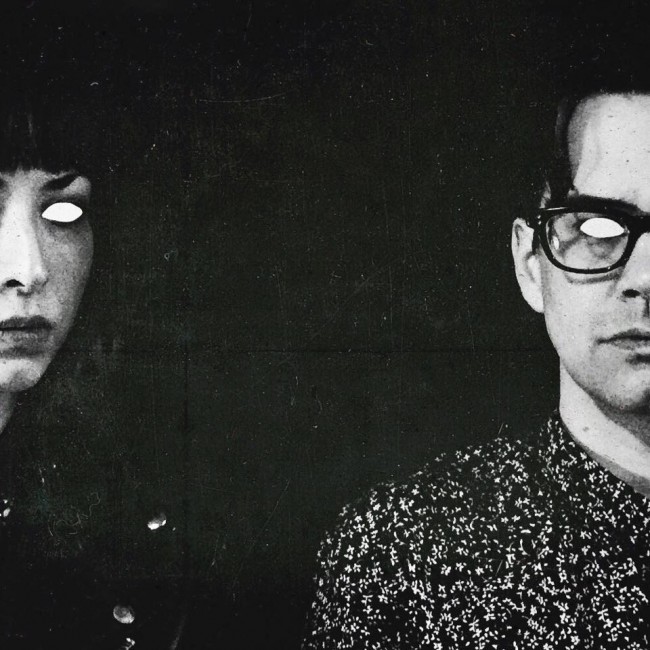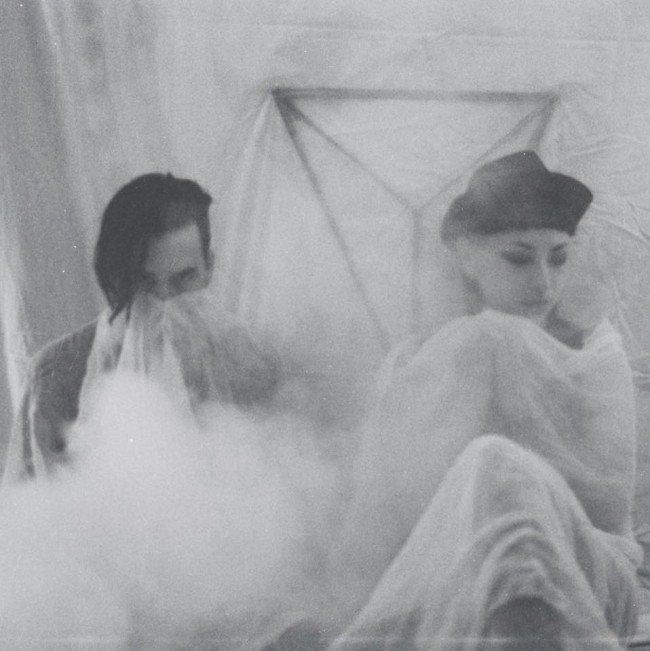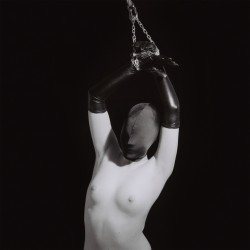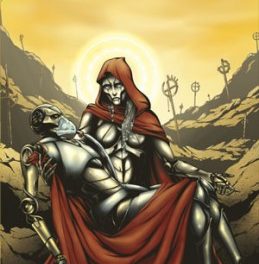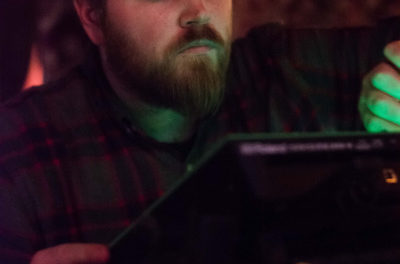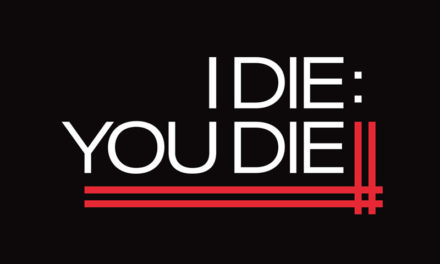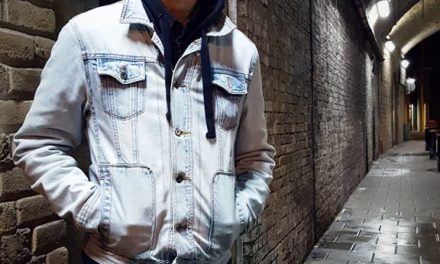You don’t need locals like us to make the case for self-described hard beat duo Animal Bodies. Regular west coast gigging, spells in Europe, and sophomore record The Killing Scene have all helped the band carve out a respected place for themselves in the dark synth world. Despite that welcome reception, the band remain something of an enigma, preferring to take a reserved approach to social media and self-promotion.
While (full disclosure) we’ll be spinning at an upcoming show the band’s playing at here in Vancouver, we wanted to talk to the pair under more settled circumstances. Over absinthe in a Railtown apartment, we talked about the group’s creative processes, the long wait between their records, and the new wave of dark music on the west coast.
ID:UD: You’ve played your image and identity really close to the vest for most of the band’s existence, and your web presence doesn’t tend to have any information about either of you individually. Is that to avoid taking the focus off the music? Is there a big division between what you want to present as Animal Bodies and what you want to keep to yourselves?
Sam: I don’t think we’ve really thought about it to be honest. How we present when we play is a combination of a lot of things, but predominantly it’s just who we are how we feel about what we’re doing. I certainly don’t think there’s a conscious decision to have a persona or be something when we’re playing that’s not who we are. Would you agree with that?
Natasha: It’d be kind of stressful to try to be anyone else. *laughter* I guess I’m not the kind of person who wants to be in the spotlight.
ID:UD: Is it a way to avoid that sort of attention then?
Natasha: Not really since I don’t think it’s a conscious decision, I think we just naturally kind of melded to that.
Sam: I think of a lot of it is that we’re really focused on what we’re doing when we’re live. I don’t want to screw up what I’m playing. *laughter* I don’t think there’s a conscious decision to come off as anything but us, doing what we’re doing.
ID:UD: So would you say then that you’re more focused on playing then any sort of “capital P” performance?
Sam: I will say I think we’ve grown into being more comfortable live. I don’t think that there’s any conscious effort to put on a performance. We’ve got ideas with how to surround ourselves with things that will contribute to what we’re doing visually.
ID:UD: One of the more striking things about your live show is the playing of all basslines live on keys, which kind of runs in the face of how we often see synths being used: just for quick leads or for harmonic pads (or backing tracks). Was that a conscious decision to be doing something different or just a the natural result of you playing with gear?
Sam: Again I don’t think it was conscious other than just I like to play those basslines, they’re fun to play.
Natasha: We jam a lot, we’re not really programmers in the way we write songs so it sort of comes from that.
Sam: We use sequencing and some pre-recorded tracks for drums and small parts, but ultimately our music is about the guitar and vocals and bass and being able to play those live is important.
Natasha: And switch it up constantly rather than having to stop and reprogram. It’s more in the moment.
Sam: When you talk about synthesizers and sequencing, when you sequence a line as opposed to playing it you come up with something very different. I think we wouldn’t be doing what we do if we were sequencing those parts. It would be very different.
ID:UD: So your writing process resembles what you do live?
Natasha: We basically have our new album done right now, and that was all jams. We would jam for five hours, then have some drinks and listen back to the recordings later to filter through them and decide what to keep.
Sam: From there other elements that live would be played back or sequenced become more production elements. What you’re seeing us perform live is the backbone of the songs, what makes them what they are. With electronics there’s lots of room to dress things up a bit, but the main parts are what we want to do live.
ID:UD: The jump from Kiss of the Fang to The Killing Scene was sonically pretty large, but there was a period of three or so years between those records. The songs on the latter record are so focused and immediate. Is honing in on your sound still an ongoing process for you? Figuring out what Animal Bodies sounds like?
Natasha: There is a jump for sure and I think our sound is still evolving. It’ll show in the new stuff we’re working on. It takes elements from some of our previous songs and goes way farther.
Sam: Almost since day one we’ve had a sense of where we were going. It’s always been a thing we were chasing and right now we’re closer to it than we have been in the past. I hope we never get there…
Natasha: It would be absolutely boring!
Sam: Once you reach that point do you keep doing it over and over until it becomes a parody of itself? I hope we never get to that point, there’s two of us working together so it continues to be a moving target. The new stuff is as close to what we feel like we should sound like as we’ve come. We’re really harsh critics of our own stuff, so for us to feel like we’re this close is a big deal to us.
ID:UD: This will be a much quicker turnaround. Is there a reason why this one came together more quickly?
Sam: Well despite there being quite a pause between those two records, I think we’ve always worked fairly quickly.
Natasha: There was a lot of material from that time period we chose not to use.
Sam: We actually had a second album almost fully recorded that we didn’t release, still on our hard drives. The Killing Scene is actually our third album. Feeling like we’re getting so close to what we want to do is really inspiring and we’re working quite quickly.
Natasha: Being in Europe was very inspiring, we did a lot of writing there. Same with the first west coast tour. Most of these songs came from a one month chunk of us jamming all the time.
ID:UD: How long have you been working together?
Natasha: We had one project a long time ago where we worked with a drummer, but that didn’t last for very long. We decided to start Animal Bodies in 2010. We did [Vancouver’s experimental music festival] Music Waste as our first show as Animal Bodies.
Sam: That original project we had with the drummer was trying to find our sound.
Natasha: It was way more synth punk. It wasn’t us. We needed to start from scratch.
Sam: I think we always struggled with how electronic we wanted to go.
Natasha: People have wanted to drum with us but it’s never worked out. We’ve tried out lots of people but we don’t have room for anyone.
ID:UD: It seems like so much of the appeal of the band comes from this hard to describe mood or atmosphere attached to you, that comes from a dynamic between you two. Is that having an extra person in the band might disrupt that?
Natasha: I think so. It’s not even so much drums, it could be cello or something else. Just having an extra person to try to explain ideas too makes things so much harder. We just know, even when we’re jamming. We don’t have to explain things too each other. We don’t stop while we’re jamming to be like “Oh maybe repeat this and I’ll play that”, we just press record and go.
Sam: Our interests fluctuate and move around but we have a good sense of how they change, and I think we had that from day one, before we could even really put our finger on what it was.
ID:UD: You use sex and BDSM imagery in a really visceral way in both the lyrics and album artwork for The Killing Scene. Where a lot of synth music is kind of sexless or cartoonish about it, the way you employ it feels really dangerous and real. How important are those themes to the make up of Animal Bodies? Is it something you ever shy away from?
Nastasha: It wasn’t a super conscious decision. I think some people might even misunderstand some of our lyrics. We didn’t set out to be super sexy or anything. I think at the end when it all came together we looked at it and realized wow, this is pretty S&M.
Sam: We realized it might be a question we have to answer, but we don’t have a specific answer for it. It’s just made sense to go there visually.
Natasha: Even “Deep Sleep” and “Sex Power” aren’t what people might think they’re about and we’re fine with that.
Sam: On an artistic level it’s important to create dialogue, with what they bring to the work and draw their own conclusions. If you get put too much thought into [how people will interpret it] you don’t act as a mirror in a way I think an artist should be able to act. Who really gives a shit what we have to say when people have their own ideas and interpretations?
ID:UD: That sort of attitude feels very much like Animal Bodies to us, the idea of keeping things sort of opaque in an age when you have instant access to artists and can find out everything about them the moment you first hear their record.
Sam: That is definitely something that was a decision on our part, to keep the focus on the music. The work should speak for itself.
ID:UD: Before we started recording, we were talking about some of the shows you just played up and down the west coast. How did that go?
Natasha: It was really good. It was a little shorter than the one we did before, but there was good turnouts and a lot of love. *laugh*
Sam: There’s a lot happening on the west coast right now, and that’s refreshing for us. It hasn’t always been that way in Vancouver for us, that’s for sure. So being able to see who people coming out to the shows and getting some context for what we’re doing and some understanding based on other bands who are doing similar things to what we’re doing.
Natasha: There’s so many good bands out right now, it’s really nice. All the bills we played it was like “Nice!”
ID:UD: It really does feel like things have improved around Vancouver for this sort of music in the last three or four years.
Sam: I personally think it’s a west coast thing. It doesn’t have a name yet, and people’s reference points for it are limited to styles and genres of music that have happened in the past, that’s what’s being attached to it. When we were first getting started it was really hard to get people to come out to our shows.
Natasha: There was nowhere to play, and no real interest in what we were trying to do.
Sam: Maybe in the last year and year and a half we’ve seen a turnaround in Vancouver in terms of people’s interest in this kind of music, but also in terms of new bands making this kind of music, which is great to see.
ID:UD: Is there a big difference in the kinds of people who come out to your shows in Europe vs North America?
Natasha: Not a totally different crowd, but there’s a much larger scene over there.
Sam: I think it helps in Europe that you can so easily cross from country to country. It allows for influences to cross over as well. There’s more of an interest in this sort of music.
Natasha: People seem more outwardly passionate. People dancing more, closing their eyes and getting into it. Over there they have less hang-ups about getting into stuff.
ID:UD: It’s been interesting to see some integration of scenes, like with people we recognize from the more traditional goth club scene here in Van start to come out to your shows here in Vancouver.
Sam: I think it’s easy to get into a feedback loop with some of these scenes. If you’re passionate about it and that’s the kind of music you want to make or be into I understand that, but it’s good to be into some new ideas as well. I think of it like a picture, when it first starts it’s got all kind of detail to it. But over time if you trace it, and then trace that and trace that it ends up as a blob, it doesn’t represent what it originally was. Sometimes it’s best to throw that away, start fresh with something new.
ID:UD: With that idea in mind, how do you feel about people slotting Animal Bodies into existing styles like EBM and darkwave?
Natasha: I don’t think we really fit in anywhere, which is why we decided, okay, we’re hard beat.
Sam: It used to bother us because people in Vancouver used to peg us as a goth band and we’re just not.
Natasha: We have a lot of influences from all over the place, which is I think why we sound how we do. People used to say “Oh you sound like Siouxsie and the Banshees” even though we don’t really, but that’s there only reference point for a woman making dark music.
Sam: I find it’s happening less today then when we first got started. There is a lot more coming up along the west coast so for us I’m seeing those sorts of reference points are becoming less rooted in the past and more contemporary to what’s going on. It’s good to hear about bands doing the same sort of thing and for us to be talked about in that context. That’s new for us and we’re enjoying it for sure.
ID:UD: We’re curious about your use of the modular [synthesizer], which has this reputation of being a very ‘noodly’ instrument, but your sound is still very focused.
Natasha: The sound design aspect is really personal to us I think.
Sam: With modular synthesizers it’s easy to take something with a ton of knobs and just throw a whole bunch of paint at a canvas. It’s important to understand how it works and how the signal flow works to be able to use it to its potential. Modular synth or any electronic instrument. Software is very popular and accessible and I think that’s great, but the potential is there to create your own sound if you learn it.
ID:UD: Is that part of your creative process then? Learning new pieces of gear, feeling it out and how to integrate it?
Sam: It’s important to keep some level of naivete, that’s what allows you to experiment and do new things. It’s not too often we integrate new stuff, we have a stable set-up at this point. Allowing yourself to be a bit naive but also having a clear understanding of how it operates is tremendously important.
ID:UD: Like being able to make happy accidents?
Sam: Definitely, and knowing when to back-up when an interesting accident happens and not allowing your understanding of the instrument or what your intention was when you started out.
ID:UD: About a year back you posting something about kind of going into isolation for writing and recording The Killing Scene. Do you approach writing as a sort of hermetic, insular process?
Natasha: We like to get away to record, it’s just nicer that way. With studios it can be so stressful, it’s not like the 70s where you could rent a studio for two weeks and just record. It’s so expensive and thinking about having this four hour time slot to do what you’re trying to do. It kind of ruins the process for us, it’s niceto get out of town, set up all our stuff and do it ourselves.
Sam: Ultimately the recording process for us is an extension of the writing process, to have another person or an environment or space involved in writing would be really disruptive. We need our space.
Natasha: At this point we do everything ourselves except mastering. That’s really important for us. I think we’re bad at explaining ourselves, it’s not that people can’t get it but we have something in mind, we’re locked and we both know what we’re trying to do so there’s no point getting someone else involved. We’re not the kind of band who would work with an outside producer, it would just throw things off.
ID:UD: To round things off, we were talking a little earlier about your upcoming show at Terminus in Calgary; any thoughts on the festival?
Natasha: We’re super excited about it, we’ve never played Calgary. We haven’t seen High-Functioning Flesh yet, which is unbelievable.
Sam: We’re looking forward to making some connections with bands on the east coast, bands we haven’t played with before or had a chance to meet. It’s really cool that it’s a festival happening in Canada, we’re not having to cross a border to get to it. It also seems like a festival where people are very passionate about the music, and we’re a little nervous because we’re a newer band for people to see, but we’re really looking forward to it.
Animal Bodies are playing The Hindenburg in Vancouver on June 26th with Flowers & Fire and the I Die: You Die DJs, and Calgary’s Terminus Festival July 24th-26th. Their most recent album The Killing Scene is available via Bandcamp.

